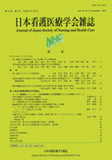Japanese
English
- 有料閲覧
- Abstract 文献概要
- 参考文献 Reference
抄録
目的:女性介護者の筋骨格系症状の発症状況と症状に関連する要因を明らかにする。
方法:在宅の女性家族介護者160名(平均年齢62.8歳)(介護者群)と非介護女性160名(63.0歳)(対照群)を対象に筋骨格系症状や生活習慣を含む自記式質問紙調査等を行った。
結果:介護者群は、「首・肩・背中のこり」(60.6%)と「腰痛」(55.0%)を有す者の割合が、有意に高く、ストレス、睡眠障害を訴える者、高血圧者の割合も高かった。一方、職業、運動習慣を有す者の割合は有意に低かった。多変量解析の結果、「首・肩・背中のこり」は、ストレスと睡眠障害との間に有意な正の関連、運動習慣は有意な負の関連を示した。一方、「腰痛」は、ストレスと介護していることが有意な正の関連を示した。
結論:介護者群の「首・肩・背中のこり」に対しては、ストレスの多さ、運動習慣の無さ、睡眠障害の関与が示唆された。一方、「腰痛」には、ストレスと介護特有の要因が関わっている可能性が推測された。
Abstract
Objective: The purpose of this study is to clarify the lifestyle factors associated with musculoskeletal symptoms of female caregivers.
Methods: The subjects were 160 female in-home primary caregivers(Average age ± standard deviation: 62.8 ± 11.9 years) and 160 noncaregiver females(63.0 ± 12.2 years). They were asked to fill out a self-administered questionnaire about lifestyle and health status, including musculoskeletal symptoms.
Results: As for musculoskeletal symptoms, the proportions of subjects with stiffness in the neck, shoulder, or back and those with lumbago in the caregivers(60.6% and 55.0%, respectively) were significantly higher than those in the noncaregivers(46.9% and 33.8%, respectively). The proportions of subjects who felt stress and who had sleep disturbance in the caregivers were significantly higher than those in the noncaregivers. More subjects in the caregivers had hypertension. The proportions of subjects who were employed and who exercised regularly were significantly lower in the caregivers. By multivariate analysis, both the self-reported stress intensity and sleep disturbance were positively associated with the stiffness in the neck, shoulder, or back and regular exercise was negatively associated. On the other hand, self-reported stress intensity and caregiving were mutually and independently associated with lumbago.
Conclusions: More female in-home primary caregivers felt stiffness in the neck, shoulder, or back and lumbago than noncaregiver females. The stiffness of the neck, shoulder, or back was suggested to be due to stress, sleep disturbance, and lack of exercise in female caregivers, while lumbago may be associated with factors specific to the caregiving situation other than lifestyle besides stress.
Copyright © 2012, Japan Society of Nursing and Health Care All rights reserved.


